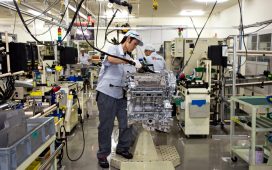Britishvolt administrator EY has shortlisted five potential buyers for the collapsed battery start-up, as the deadline to sell it with its intellectual property and staff nears.
If a deal is not struck over the next five days, the Britishvolt site in Blyth, Northumberland, will be sold without the IP and employees.
Among the five suitors are Australian firm Recharge Industries, which has existing plans to build a gigafactory in Geelong, near Melbourne, Australia.
Citing three people familiar with the matter, the Financial Times reported that the consortium of investors that tabled a last-minute rescue bid for Britishvolt had also been shortlisted by EY.
Of value to buyers will be Britishvolt’s prototype battery technology – reported by the FT to have impressed several car manufacturers and investors; with a small order from Mercedes-Benz – as well as its 26 remaining staff, who include many of the start-up’s battery experts.
The £100 million grant offered to Britishvolt by the Government is also expected to be attractive to suitors, although it is likely that a successful bidder would have to reapply for money, according to the FT report.
However, limited development at Britishvolt’s Blyth, Northumberland site, plus the company’s significant debts – reported by The Guardian to be worth as much as £120 million – limit its appeal.
Britishvolt’s failure has prompted Parliament’s Business, Energy and Industrial Strategy Committee to launch an inquiry into whether EV battery production is viable in the UK – or if the importing of power sources is sufficient.
Committee chair Darren Jones said: “This inquiry will look at what’s holding back the development of electric car batteries in the UK and what needs to be done to protect the thousands of jobs across the country in this important sector.
“The future of car manufacturing in the UK is dependent on our ability to make electric vehicles, and to be able to export them into the EU. That means we need local supplies of electric vehicle batteries – something we’re failing significantly behind on, compared to other parts of the world.”
According to a report by The Faraday Institution, the UK will need around 100GWh of battery supply (equivalent to five gigafactories) by 2030 to satisfy demand for EV production. This will rise to nearly 200GWh (10 factories) by 2040.
At the time of writing, the only UK gigafactory to have secured deals with a global cell supplier and a major manufacturer is Envision AESC’s planned expansion at the Nissan factory in Sunderland. It promises an output of 11GWh from 2024, eventually rising to 38GWh, supplying batteries for the third-generation Nissan Leaf.










